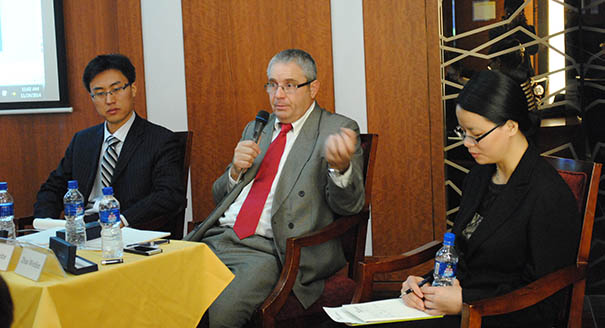Registration
You will receive an email confirming your registration.
After the latest talks in Vienna, negotiations over Tehran’s nuclear program have been extended until the end of June 2015. The United States, China, Iran, and other P5+1 countries will continue to seek to reduce the program’s military potential while also preserving Tehran’s legitimate right to generate nuclear energy. Competing aims of disparate stakeholders and recent geopolitical changes in Eastern Europe have further complicated the negotiating process, the results of which will have broad implications for Middle Eastern security, China-Iran relations, and beyond.
Carnegie’s Ariel Levite presented a detailed overview of different stakeholders’ strategic considerations in these negotiations and provided an unofficial view of the Iranian nuclear issue from the perspective of Israeli policymakers. Tong Zhao then moderated a discussion.
Discussion Highlights
- Domestic Tensions: Panelists noted that Washington and Tehran both face skeptical domestic audiences, which have narrowed the space for an agreement. Some members of the U.S. Congress remain distrustful of Iran based on memories of the 1979 revolution and subsequent hostage crisis. Iran’s Republican Guard and other hard-line conservatives fear that normalized relations with the United States could be politically destabilizing for Tehran.
- Shared and Divergent Core Goals: Iran still seems intent on both ending sanctions and retaining a nuclear hedge, which could preserve the country’s capacity for nuclear weapons, panelists said. Besides Tehran, all the negotiating parties share an interest in ensuring that Iran does not acquire such capabilities. Yet they also have their own agenda, panelists added. China must balance the importance of Iranian oil to the country’s energy security and Beijing’s aversion to unilateral sanctions. Moscow is wary of U.S.-Iran bilateral relations becoming too amicable. For Washington, the nuclear issue may become linked to requests for Iran’s cooperation against the Islamic State.
- At the Negotiating Table: The negotiations, panelists explained, have centered on four issues. The first matter is whether the agreement and international supervision will apply to only the nuclear fuel cycle or also possible weaponization activities, which Iran claims is beyond the IAEA’s mandate. Another concern is how to implement transparent verifications to ensure that IAEA safeguards are upheld. The third issue is how to design incentives that will encourage and reward Iranian compliance while simultaneously dissuading Tehran from reneging. The fourth matter is how to stage implementation to satisfy both Iran’s desire for reduced sanctions and the other stakeholders’ insistence on long-term compliance.
- Additional Challenges to Talks: Panelists predicted that extending negotiations could allow domestic hardliners in Washington and Tehran to undermine an agreement. To prevent this, panelists noted the importance of consolidating matters of consensus included in the Joint Plan of Action while also managing ongoing contentions. Immediate concerns include how to frame the IAEA’s authority to oversee Iran’s comprehensive nuclear program in a manner amenable to Tehran. Panelists concluded that this is particularly vital because Tehran appears determined to enrich more fissile material than its only civilian nuclear plant could use.
- Establishing Precedent for Nuclear Proliferators: Panelists maintained that the implications of these talks extend beyond Iran and P5+1 countries. The latter must ensure that negotiations both preserve the viability of the Nuclear Non-Proliferation Treaty and forge a stronger normative basis for compliance. One panelist suggested that a less stringent agreement might embolden North Korea and also prompt countries like Saudi Arabia to pursue a nuclear agenda. Iran is all the more important because global proliferation cases to date have not yet contributed to a consistent template to address other states’ future nuclear ambitions, panelists concluded.
Ariel (Eli) Levite
Ariel Levite is a nonresident senior associate in the Nuclear Policy Program at the Carnegie Endowment. Prior to joining Carnegie, Levite was the principal deputy director general for policy at the Israeli Atomic Energy Commission from 2002 to 2007. He also served as the deputy national security adviser for defense policy and was head of the Bureau of International Security and Arms Control in the Israeli Ministry of Defense.
Tong Zhao
Tong Zhao is an associate in Carnegie’s Nuclear Policy Program based at the Carnegie–Tsinghua Center for Global Policy. His research focuses on strategic security issues, including nuclear arms control, nonproliferation, missile defense, strategic stability, and China’s security and foreign policy.
Zhao Weibin
Zhao Weibin is a senior colonel and a research associate at the Center for China-U.S. Defense Relations at the Academy of Military Science of the Chinese People’s Liberation Army. She is an expert on China’s defense policy, U.S.-China relations, and nonproliferation of weapons of mass destruction.
